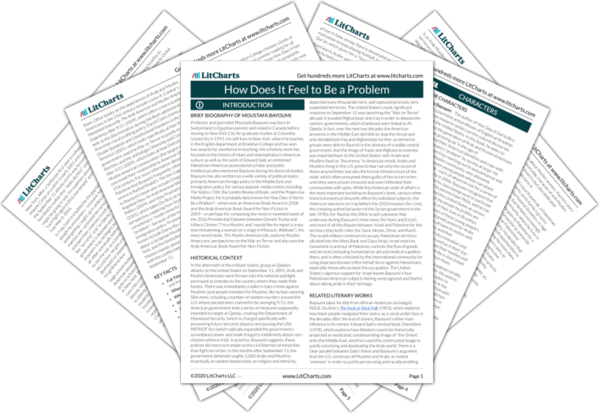Akram Quotes in How Does It Feel to Be a Problem?
Akram Quotes
What do you do when everything and everyone—from teachers to TV—is screaming that you and your culture just don't belong? You have to come up with your own solutions, and Akram has found his answer. He's quitting the United States and heading to Dubai, a newfound land of opportunity, a global oasis of modern wealth done up Arabic style. Dubai. It's the latest Arab-American dream.
He's a curious mix that isn't so strange in Brooklyn, equally at home with Arabs, African Americans, and West Indians. He's a twenty-first-century United States American, absorbing and refracting all the ethnicities and histories surrounding him. What he loves most about Brooklyn is this heady human geography.
American idiom: “IN ALLAH WE TRUST. EVERYONE ELSE MUST PAY—NO CREDIT.” The customers laughed.

Akram Quotes in How Does It Feel to Be a Problem?
Akram Quotes
What do you do when everything and everyone—from teachers to TV—is screaming that you and your culture just don't belong? You have to come up with your own solutions, and Akram has found his answer. He's quitting the United States and heading to Dubai, a newfound land of opportunity, a global oasis of modern wealth done up Arabic style. Dubai. It's the latest Arab-American dream.
He's a curious mix that isn't so strange in Brooklyn, equally at home with Arabs, African Americans, and West Indians. He's a twenty-first-century United States American, absorbing and refracting all the ethnicities and histories surrounding him. What he loves most about Brooklyn is this heady human geography.
American idiom: “IN ALLAH WE TRUST. EVERYONE ELSE MUST PAY—NO CREDIT.” The customers laughed.











